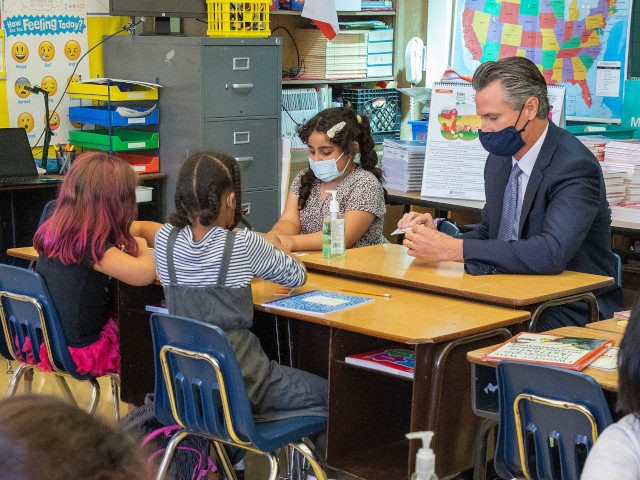Only 36 percent of U.S. adults are satisfied with K-12 education quality in the United States, matching the record low in 2000, a new Gallup survey found.
“Americans’ satisfaction with the quality of K-12 education in the U.S. has fallen six percentage points in the past year to match the record-low 36 percent reading on this measure, which Gallup has tracked for 24 years,” according to the survey report.
Gallup found that lower satisfaction from Republicans and Republican-leaning independents since Joe Biden became president has “driven the overall decline in ratings of the nation’s K-12 education quality.” Only 25 percent of GOP voters say they are at least somewhat satisfied with U.S. education. which is the lowest percentage recorded for the group, five points lower than last year, and roughly half of what it was in 2019 and 2020.
The satisfaction of Republicans and Republican-leaning independents notably dropped 14 points between 2020 and 2021, from 49 percent to 35 percent, when the coronavirus pandemic and resulting school shutdowns across the nation took place.
La Mesa, CA trustee Bell-Fontenot goes off on fellow board members, one of which is Hispanic, saying returning to in-person learning is “a very white supremacist ideology,” telling them to “[check] their privilege,” and that mandating in-person instruction is “slavery.”
1/5 pic.twitter.com/qIEiMPstsF— Reopen California Schools (@ReopenCASchools) February 25, 2021
That time allowed many parents across the country the unique opportunity to critically look at what their children were learning. Some parents were shocked at what they found, including critical race theory, gender ideology, and even pornography in school books and assignments. School shutdowns, pushed by large left-wing teachers unions, also led to irretrievable learning losses in children who were made to stay home from in-person instruction.
As schools have trickled back to their normal rhythm within the past few years, they have continued to be a battleground. In some states, schools are accused of hiding “social transitions” from parents and have allowed trans-identifying males to invade female sports teams’ spaces, which in some instances has enabled alleged sexual assault. All of these things have led to a flood of ongoing backlash, with concerned and conservative parents running to snag school board seats from local ideologues and Republicans spearheading legislation on the state and national level.
“Why are we affirming the mental confusion of this boy and putting the safety of women in jeopardy by allowing mentally confused men to use women’s spaces?”
👑 ❤️ 👑 A young women bravely speaks out at the Riverside Unified District Board Meeting on 4/27/2023
A boy has been… pic.twitter.com/6XHUVMZoNP
— WomenAreReal (@WomenAreReals) April 28, 2023
Gallup found that while partisans on both sides of the aisle have not been overwhelmingly satisfied with education in the U.S. throughout the trend, GOP voters’ latest satisfaction is 18 points below the 43 percent historical average for the group.
On the other side of the aisle, 44 percent of Democrats and Democrat-leaning independents are at least somewhat satisfied with education in the United States, although that percentage is five points lower than the 2000 average.
“The latest divergent readings among partisans are in stark contrast to 2000, the last time overall satisfaction among U.S. adults was at today’s level. At that time, there was little difference between partisans’ satisfaction levels,” Gallup found. “The intensity of partisans’ satisfaction also differs, with more than three times as many Republicans (38 percent) as Democrats (12 percent) in 2023 saying they are completely dissatisfied. For their part, a 43 percent plurality of Democrats say they are somewhat dissatisfied.”
In contrast, 76 percent of K-12 parents reported being “completely” or “somewhat” satisfied with their own child’s education, which is higher than the 67 percent low from 2013.
“Since 1999, when Gallup started asking these two questions every August, there has been a consistent, significant gap between parents’ satisfaction with their child’s education and Americans’ views of U.S. education in general, averaging 31 percentage points,” Gallup noted.
Broken down, 35 percent parents of K-12 students are “completely satisfied,” while 41 percent are “somewhat satisfied,” 12 percent are “somewhat dissatisfied,” and nine percent are “completely dissatisfied.”
“Meanwhile, 8 percent of Americans are completely satisfied with K-12 education nationally, 28 percent are somewhat satisfied, 38 percent are somewhat dissatisfied and 25 percent completely dissatisfied,” according to the survey report.
Gallup conducted the poll between August 1-23, 2023 with 1,014 U.S. adults. The margin of sampling error is ±4 percentage points at the 95 percent confidence level for the sample of national adults. The margin of sampling error is ±8 percentage points at the 95 percent confidence level for the sample of parents of 219 K-12 students.

COMMENTS
Please let us know if you're having issues with commenting.